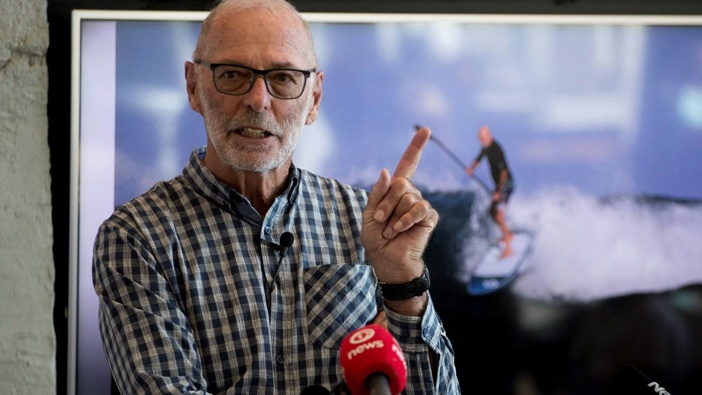Auckland Council’s soaring budget hole, storm costs and higher water bills could cost the average household another $560 a year during a painful cost-of-living crisis.
But a ratepayer group is calling for the council to sell assets and make large-scale cuts to its costs “rather than reaching into ratepayers’ wallets”.
Watercare has locked in a $116 rise in the average water bill from July and yesterday’s bad news that the council’s budget hole and storm-related costs have soared to a combined $375 million could lead to a rates rise of $446 for the average household.
The annual water bill is rising by 9.5 per cent from $1224 to $1340 and rates could rise from $3306 to a maximum of about $3750 for the average home.
The extra burden on household budgets begins on July 1 - the day after the 25-cents-a-litre fuel tax subsidy ends.
It also comes as the looming recession is tipped to be deeper than previously thought, Kiwi families face the prospect of a hard-hitting interest rate crunch as mortgages come up for renewal, and the Reserve Bank forecasts rising unemployment.
Auckland households face even bigger rises in council costs than was first thought. Photo / Alex Burton
The council’s budget hole rose from the $90m-$150m range estimated last year to $295m earlier this year and now to $325m. Auckland Mayor Wayne Brown blamed a combination of council debt, higher interest rates and his predecessor Phil Goff using a one-off Three Waters payment of $127m to prop up last year’s budget.
“Enough is enough. We must get serious about the council’s financial position. I did not create this hole, but I am determined that the council fix it, so it doesn’t just keep growing,” Brown said.
“Unless we can set Auckland Council on a path of financial sustainability and reduce our debt, then this gaping hole will only get bigger in the years to come.”
As well as the budget hole, group chief financial officer Peter Gudsell said storm-related costs in the budget had risen from $20m, for things such as higher insurance premiums, to $50m for repairs and maintenance to council assets and setting up a recovery co-ordination office.
In theory, rates could rise by 22 per cent to plug the budget hole and pay for storm-related costs, but a rise is limited to 13.5 per cent because that was the highest level set during the budget consultation process.
It is now up to councillors to decide on a mix of options to produce a balanced budget by the end of June.
/cloudfront-ap-southeast-2.images.arcpublishing.com/nzme/UOP2GUAQJX6RQNUY4OQ2VW3S4E.jpg)
The Auckland Council is having to trim costs at its headquarters and other businesses. Photo / Doug Sherring
This year’s draft budget was already one of the most challenging in the 13 years of the Super City before yesterday’s bad news - containing many difficult and unpopular choices to plug a $295m shortfall.
In his earlier draft budget, Brown proposed a mix of measures to produce a balanced budget, including cutting unnecessary and inefficient spending, demanding better performance from council organisations, reducing debt servicing costs by selling airport shares, increasing rates and potentially borrowing up to $75m.
The council’s shares in Auckland Airport are currently valued at $2.2 billion.
Among the most contentious proposals are plans to cut regional, community and social services by $20m and regional contestable grants by $3m in the areas of arts, culture and events.
It was proposed to cut funding for things such as Music in Parks, CultureFest and Botanic Gardens events, while $2m would go from the Citizens Advice Bureau, and funding for homelessness initiatives would stop. Local boards are also in line for a $16m cut in funding activities.
A mayoral spokesman said it was too early to consider what further cuts could be on the table. Brown still planned to keep rate rises as low as possible, “but we can’t say at this stage how low we can keep them”.
/cloudfront-ap-southeast-2.images.arcpublishing.com/nzme/QNTGFQ75RH6JLH4OS43XIEK37A.jpg)
Events such as Sculpture in The Gardens at Auckland Botanic Gardens could have funding cut under budget proposals. Photo / Doug Sherring
Until now, the proposal has been for a 7 per cent rates rise but, with rating changes, it equated to a 4.6 per cent rates rise for households. The earlier $20m “storm respond fund” was expected to add 1 per cent to general and household rates.
Gudsell said that, like other sectors of the economy, the council’s finances had been battered by economic factors over the past six months.
“We’ve seen cost increases reflect inflation levels in a number of areas. These increases are particularly affecting the price of utilities such as electricity, and impacting the cost of asset renewals, meaning a rise in the amount of money we need to set aside for depreciation.”
He said the final budget would require trade-offs, including ownership options for the council’s airport shares, higher rates and prudent use of debt.
“Different trade-offs have different consequences, and this now needs to be considered as part of the process to set the budget.”
Auckland Ratepayers’ Alliance spokesman Jordan Williams said nothing should be off the table.
”It is no longer enough to go through the budget with a fine tooth comb to pick and choose what pet projects are worth keeping - large-scale cuts are needed for anything that is not a core council function,” Williams said.
”The rising cost of living, mortgage rates rapidly increasing and households under significant pressure from recent weather events means it is time for Auckland Council to show some courage and front up with significant cost cuts and asset sales rather than reaching into ratepayers’ wallets.”
- Bernard Orsman, NZH
Take your Radio, Podcasts and Music with you


/cloudfront-ap-southeast-2.images.arcpublishing.com/nzme/SU67WQG5FVGA7LEGUYMKNOJ3EY.JPG)








